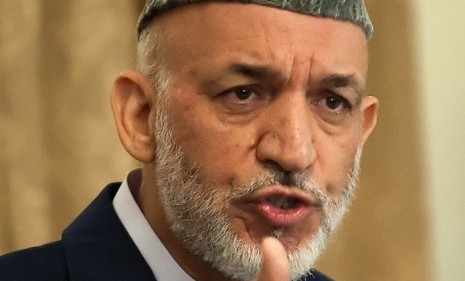Afghanistan's 'secret' deal with the Taliban
Talks have reportedly begun. Is there really any chance they could lead to a negotiated end to the war?

The Afghan government has opened "secret, high-level talks" with representatives of the Taliban, suggesting there may be hope for a negotiated end to the war. The discussions are preliminary, but for the first time the Taliban representatives are believed to be speaking for the Quetta Shura, the Afghan Taliban organization based in Pakistan, and its leader, Mullah Mohammad Omar. "They are very, very serious about finding a way out," an insider, quoted in The Washington Post, said of the Taliban. Is there any chance these talks could really lead to peace? (Watch an al Jazeera report about the talks)
The prospects are bleak: "Don't throw the confetti for the war's end yet," say the editors of The Christian Science Monitor. The U.S. and Afghan President Hamid Karzai insist that the Islamist insurgents must accept the Afghan constitution, "especially its provisions for women’s rights," and "they must forswear al Qaeda." But the Taliban "deplore the constitution." No matter how badly both sides may want peace, "internal reconciliation" may be impossible.
"Talking to the Taliban: Rough road ahead"
The Week
Escape your echo chamber. Get the facts behind the news, plus analysis from multiple perspectives.

Sign up for The Week's Free Newsletters
From our morning news briefing to a weekly Good News Newsletter, get the best of The Week delivered directly to your inbox.
From our morning news briefing to a weekly Good News Newsletter, get the best of The Week delivered directly to your inbox.
Still, talking is better than fighting: If this means both sides "realize that a decisive victory is not going to be won by force of arms," says Stephen M. Walt at Foreign Policy, these talks are "an encouraging sign." If both sides are really serious, "there's a chance that the United States and its allies will get out of there sometime before 2020." Maybe then Afghanistan will revert to being a "largely neutral and not very important strategic backwater," and we'll be off the hook for the "costly and counterproductive business of nation-building."
Any deal would clearly involve tough compromises: There is no evidence that the Taliban are ready to accept Karzai's three main conditions, say the editors of The Washington Post, which are abandoning violence, renouncing al Qaeda, and accepting the Afghan constitution. In any case, to make a deal work Karzai might have to agree to the "morally repugnant" arrangement of giving the Taliban a "share of power and perhaps control over parts of the country."
"Could a deal with the Taliban end the war in Afghanistan?"
A free daily email with the biggest news stories of the day – and the best features from TheWeek.com
-
 Is Alex Pretti shooting a turning point for Trump?
Is Alex Pretti shooting a turning point for Trump?Today’s Big Question Death of nurse at the hands of Ice officers could be ‘crucial’ moment for America
-
 The best dark romance books to gingerly embrace right now
The best dark romance books to gingerly embrace right nowThe Week Recommends Steamy romances with a dark twist are gaining popularity with readers
-
 The ocean is getting more acidic — and harming sharks’ teeth
The ocean is getting more acidic — and harming sharks’ teethUnder the Radar ‘There is a corrosion effect on sharks’ teeth,’ a study’s author said